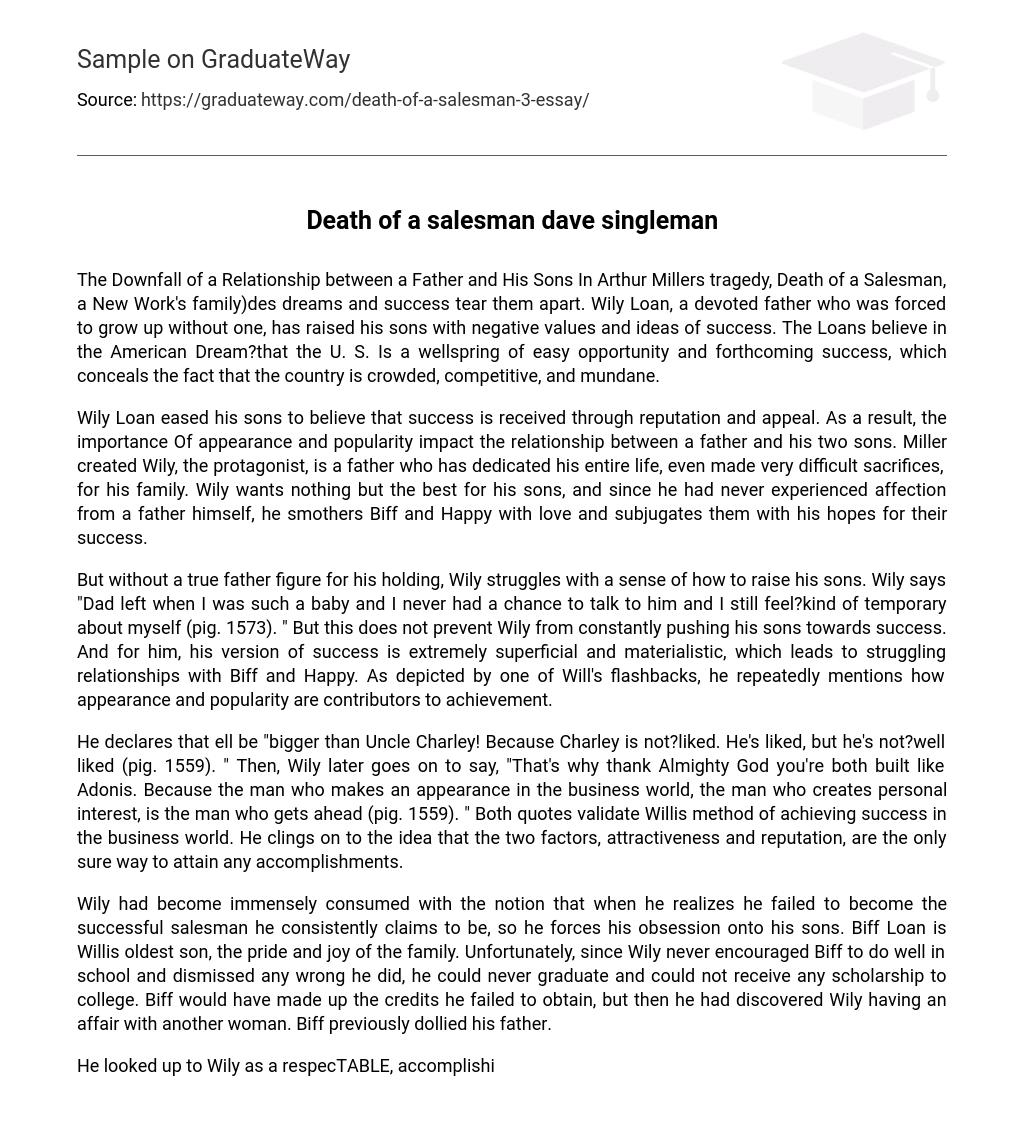The Downfall of a Relationship between a Father and His Sons In Arthur Millers tragedy, Death of a Salesman, a New Work’s family)des dreams and success tear them apart. Wily Loan, a devoted father who was forced to grow up without one, has raised his sons with negative values and ideas of success. The Loans believe in the American Dream?that the U. S. Is a wellspring of easy opportunity and forthcoming success, which conceals the fact that the country is crowded, competitive, and mundane.
Wily Loan eased his sons to believe that success is received through reputation and appeal. As a result, the importance Of appearance and popularity impact the relationship between a father and his two sons. Miller created Wily, the protagonist, is a father who has dedicated his entire life, even made very difficult sacrifices, for his family. Wily wants nothing but the best for his sons, and since he had never experienced affection from a father himself, he smothers Biff and Happy with love and subjugates them with his hopes for their success.
But without a true father figure for his holding, Wily struggles with a sense of how to raise his sons. Wily says “Dad left when I was such a baby and I never had a chance to talk to him and I still feel?kind of temporary about myself (pig. 1573). ” But this does not prevent Wily from constantly pushing his sons towards success. And for him, his version of success is extremely superficial and materialistic, which leads to struggling relationships with Biff and Happy. As depicted by one of Will’s flashbacks, he repeatedly mentions how appearance and popularity are contributors to achievement.
He declares that ell be “bigger than Uncle Charley! Because Charley is not?liked. He’s liked, but he’s not?well liked (pig. 1559). ” Then, Wily later goes on to say, “That’s why thank Almighty God you’re both built like Adonis. Because the man who makes an appearance in the business world, the man who creates personal interest, is the man who gets ahead (pig. 1559). ” Both quotes validate Willis method of achieving success in the business world. He clings on to the idea that the two factors, attractiveness and reputation, are the only sure way to attain any accomplishments.
Wily had become immensely consumed with the notion that when he realizes he failed to become the successful salesman he consistently claims to be, so he forces his obsession onto his sons. Biff Loan is Willis oldest son, the pride and joy of the family. Unfortunately, since Wily never encouraged Biff to do well in school and dismissed any wrong he did, he could never graduate and could not receive any scholarship to college. Biff would have made up the credits he failed to obtain, but then he had discovered Wily having an affair with another woman. Biff previously dollied his father.
He looked up to Wily as a respecTABLE, accomplishing man, but realizes that he was only a liar. Since then, the relationship between Wily and Biff becomes unsTABLE. While Biff is desperate to impress and please his father, Wily is constantly complaining about his son’s lack of success, which prompts many heated arguments whenever the two confront each other. Even if the two continuously quarrel with one another, both remain to love the other. In the end, Wily “is choking with his love (pig. 1626),” that as a result, he takes his own life in order to give
Biff his life insurance money in hopes of his son using it to start a business and succeed, like he has always dreamed of. This ultimately illustrates Willis method of displaying his love for Biff. Happy, the youngest son, on the other hand and for lack of a better term, has unceasingly lived in the shadow of Biff. Happy is nothing short of his father?he has Willis unrealistic self-confidence and delusion. Like Biff, Happy has suffered from Will’s expectations of success, but his father had paid little attention to any of his actions, which prompts him to be even more determined to please Wily than his brother.
He attempts to achieve this by emulating Wily. Sadly, though, Wily remains to be only concerned with Biff. Even when Wily dies, Happy can end Wing to live a life his father pursued and forced on him and his brother, but he insists on accomplishing his father’s foolish dreams of success. At the funeral Happy proclaims that “He had a good dream… He fought it out here and this is where I’m goanna win it for him (pig. 1630). ” So, he decides to try and become a success in the New York business world along with the tenacity to justify his father’s life and dreams.





